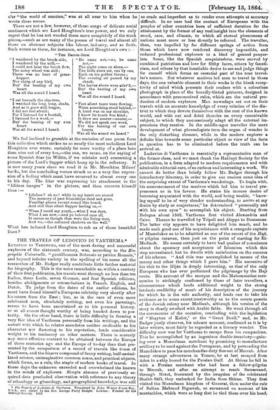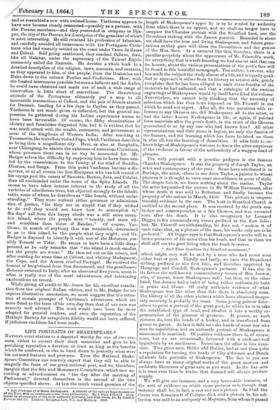THE TRAVELS OF LUDOVICO DI VARTHEMA.* LIIDOVICO DI VARTFIERA, one
of the most daring and successful explorers of the sixteenth century, was, according to the Bio- graphie Universelle, " gentilhomme Bolonais et patrice Romain," and beyond infinite variety in the spelling of his name all the researches of Mr. Badger really contribute little further material for biography. This is the more remarkable as, within a century of their first publication, his travels went through no less than ten Italian, three Latin, seven German, and four Spanish editions, besides abridgments or retranslations in French, English, and Dutch. To judge from the dates of the earlier editions, he must have found himself a European celebrity very shortly after his return from the East ; but, as in the case of even more celebrated men, absolutely nothing, not even his parentage, seems to have been ascertained as to his personal history, or at all events thought worthy of being banded down to pos- terity. On the other hand, there is little difficulty in forming a very fair idea of Varthema personally from his writings, and the nateeti with which he relates anecdotes neither creditable to his character ;ler flattering to his reputation, lends considerable weight to his testimony on other matters. There is scarcely any more effective contrast to be obtained between the Europe of three centuries ago and the Europe of to-day than that pre- sented by the comparison of a record of travels like those of Varthema, and the bizarre compound of funny writing, half-assimi- lated science, unimaginative common sense, and practical objects, which forms, as a rule, the staple of modern books of travel. In those days the unknown exceeded and overwhelmed the known in the minds of explorers. Simple absence of previously ac- quired data precluded observation with reference to any theory of ethnology or glossology, and geographical knowledge was still • The Tram* of Ludovico di Varthema. Translated by John Winter Jones, Esq., and edited by the Rev. George Percy Badger. London : Printed for the Rakluyt SOeety. 1865. so crude and imperfect as to render even attempts at accuracy difficult. In no case had the contact of Europeans with the peoples of other countries been of sufficient duration for the attainment by the former of any real insight into the elements of creed, race, and climate, to which all eternal phenomena of nations must more or less directly be referred. The traveller, then, was impelled by far different springs of action from those which have now rendered discovery impossible, and reduced professional explorers to a kind of genteel pauper- ism. Some, like the Spanish conquistadores, were moved by combined patriotism and love for filthy lucre, others by fanati- cism, and others by that insatiable desire to see and judge things for oneself which forms an essential part of the true travel- ler's nature. But whatever motives led men to travel ip those days, the one valuable element in their works is the blank recep- tivity of mind which presents their readers with a colourless photograph in place of the broadly-tinted pictures, designed in accordance with preconceived rules, which are the natural pro- duction of modern explorers. Men nowadays set out on their travels with an accurate knowledge of every relation of the dis- trict to which they devote themselves with the rest of the known world, and with cut and dried theories on every conceivable subject, to which they unconsciously adapt all the external im- pressions they receive. In the middle-ages traveller the mere development of what phrenologists term the organ of wonder is the only disturbing element, while in the modern explorer a definite bias towards some particular object or view of the facts in question has to be eliminated before the truth can be arrived at.
Ludovico di Varthema is essentially a representative man of the former class, and we must thank the Hakluyt Society for the publication, in a form adapted to modern requirements and with admirable editorial care, of so carious and interesting a work. We cannot do better than briefly follow Mr. Badger through his introductory itinerary, in order to give our readers some idea of the surprising extent of Varthema's wanderings. To begin with, his announcement of the motives which led him to travel pre- possesses us in his favour. He states his intense desire of becoming acquainted with the world, and being unable, "know- ing myself to be of very slender understanding, to arrive at my desire by study or conjectures," he determined " personally and with his own eyes " to accomplish his object. Starting from Bologna about 1502, Varthema first visited Alexandria and Cairo. Thence he travelled by Tripoli and Aleppo to Damascus. The latter city appears to have delighted him much, and he made such good use of his acquaintance with a renegade captain of Mamelukes as to be admitted as one of the escort of the Haji, or pilgrim caravan, then just on the point of starting for El- Medinah. He seems certainly to have bad qualms of conscience about the apostasy and acceptance of Islamism which this step necessitated, but he dwells with satisfaction on the success of his scheme. " And this was accomplished by means of the money and other things which I gave him." His narrative of his visit to the Hijaz is deeply interesting, as that of the only European who has ever performed the pilgrimage by the Haji route. His account of the mosque and the Mahommedan cere- monies is strikingly confirmed by those of later travellers, a circumstance which lends additional weight to the strong intrinsic credibility of much of his description of the journey for which he is the sole authority, and leads one to take his evidence as to some extent trustworthy as to the vexata quastio of the Jewish colony near Medina'', although his version of the story is clearly overlaid with Arabic fable. He went through all the ceremonies of the occasion, concluding with the lapidation of " Shaytan el Kabir," or the " Great Devil," and, as Mr. Badger justly observes, his minute account, confirmed as it is by later writers, must fairly be regarded as a literary wonder. The difficulty now was for Varthema to escape from his companions. This he accomplished by an ingenious double treachery—gain- ing over a Mussulman merchant by promising to manufacture artillery to be used against the Portuguese, and by persuading the Mamelukes to pass his merchandise duty free out of Meccah. After many strange adventures in Yemen, he at last escaped from Aden in a ship bound for the Persian Gulf. At Shiraz he fell in with a Persian merchant who had been a fellow-pilgrim to Meccah, and after an attempt to reach Samarcand, through Herat, frustrated by the irruption of the celebrated Sheikh Snff, they embarked for India from Shiraz. They first visited the Mussulman kingdom of Guzerat, then under the rule of Sultan Mahmud Bigarrah, so surnamed on account of his mustachios, which were so long that he tied them over his head, and so resembled a cow with twisted horns. Varthema appears to have now become closely connected—possibly as a partner, with the Persian merchant—and they proceeded in company to Bija- pur, the city of the Deccan, his description of the grandeur of which is most interesting. He still retained his profession of Islamism, and carefully avoided all intercourse with the Portuguese Chris- tians who had recently settled on the coast under Vasco de Game and Cabral. Still going southward, they reached Calicut, then, like all Malabar, under the supremacy of the Tamuri Rajah, commonly called the Zamarin. He devotes a whole book to a detailed description of the religion, laws, manners, and customs, as they appeared to him, of the people, from the Brahmins and Nair s down to the outcast Poulias and Poulichees. How, with the limited intercourse possible between a believer and the liars, he could have obtained and made use of such a wide range of observation is little short of marvellous. The threatening attitude of the Portuguese ultimately put a stop to all mercantile transactions at Calicut, and the pair of friends started for Burmah, landing for a few days in Ceylon as they passed. Varthema is not much given to reflection, but the general im- pression he gathered during his Indian experiences seems to have been favourable. Of course, the filthy abominations of idolatry and fanaticism disgusted him, but it is evident that ho was much struck with the wealth, commerce, and government of most of the kingdoms of Western India. After touching at Tenasserim,the travellers visited Pegu, which Varthema describes as being then a magnificent city. Here, as also at Banghella, near Chittagong, be asserts the existence of numerous Christians, whose presence there can in no way be accounted for. Mr. Badger solves the difficulty by supposing him to have been mis- led by the resemblance to the Trinity of the triad of Buddha, Dharma, and Sanga. From this point Varthema become a dis- coverer, or at all events the first European who has left record of his voyage past the coasts of Sumatra, Borneo, Java, and Celebes, then all confounded under the name of the Spice Islands. He seems to have taken intense interest in the study of all the varieties of odoriferous trees, but objected strongly to the inhabi- tants, some of whom he describes as " like beasts, without under- standing." They were without either governor or administra- tion of justice, " for they are so stupid that if they wished to do evil they would not know how to accomplish it." Six days' sail from this happy abode was a still more eccen- tric island, where the people were " beastly, and more vile and worthless than those of Randall." Of course, Var- theme, in search of anything that was wonderful, determined to go to this island, be the people what they might; and Mr. Badger is disposed to identify it with one of the Moluccas, pos- sibly Ternate or Tidar. He seems to have been a little disap- pointed, as he only remarks that " the island is much smaller, but the people are worse." He then set out on his return, and after residing for some time at Calicut, and visiting Madagascar, the Cape, and the Azores, reached Portugal. He received the honour of knighthood from Don Emmanuel, and the gentilhonnne Bolonais returned to Italy, after an absence of five years, spent in what is really one of the most adventurous and interesting explorations on record.
While giving all credit to Mr. Jones for his excellent transla- tion from the original Italian edition, and to Mr. Badger for his copious illustrative annotation, we must suggest that the reten- tion of certain passages of Varthema's adventures which are more fitted to the taste of his own day than that of our own was scarcely well advised. The work would have been far more adapted for general readers, and even the reputation of the Hakluyt Society for scrupulous fidelity would not have suffered, if judicious excisions had been made.































 Previous page
Previous page